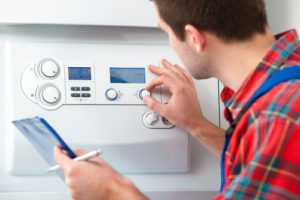 If you live in Santa Rosa, there’s a good chance that you live in a home with central heating and air conditioning. An HVAC system is practically a necessity in places such as Santa Rosa, where the weather can be scorching or chilly by turns depending on the time of year. However, many people are reluctant to use their HVAC systems because they fear the costs of maintaining them. Furthermore, many people are intimidated by the idea of arranging for heat and air repair in the Santa Rosa area. This isn’t because HVAC maintenance or repair is particularly risky or time-consuming—in fact, it is usually neither of those things. It’s simply a case of people not understanding the science behind their HVAC systems. When you don’t know what Btu stands for, when your filters need changing, or how to look for leaks in your ductwork, you may not have an idea of what is wrong with your system or how complicated the repairs will be. Naturally, in such scenarios, people tend to assume the worst—often incorrectly.
If you live in Santa Rosa, there’s a good chance that you live in a home with central heating and air conditioning. An HVAC system is practically a necessity in places such as Santa Rosa, where the weather can be scorching or chilly by turns depending on the time of year. However, many people are reluctant to use their HVAC systems because they fear the costs of maintaining them. Furthermore, many people are intimidated by the idea of arranging for heat and air repair in the Santa Rosa area. This isn’t because HVAC maintenance or repair is particularly risky or time-consuming—in fact, it is usually neither of those things. It’s simply a case of people not understanding the science behind their HVAC systems. When you don’t know what Btu stands for, when your filters need changing, or how to look for leaks in your ductwork, you may not have an idea of what is wrong with your system or how complicated the repairs will be. Naturally, in such scenarios, people tend to assume the worst—often incorrectly.
The truth is that heat and air repair in Santa Rosa is often relatively simple. There are even certain things you can do yourself to increase the lifespan of your system. Furthermore, calling a professional sooner rather than later can prevent small problems from developing into large ones, and eventually prove much cheaper than ignoring them. We’re going to examine four typical problems that HVAC systems and their owners face in the Santa Rosa area, so that you can understand your system a little better and feel more confident calling for help when it is needed.
- Having an Incorrectly Sized System: Learn What Btu Stands For
Many people have heard the term “sizing your air conditioner” or “sizing your furnace,” but they don’t fully understand them. The truth is that “sizing” in this context has very little to do with the physical dimensions of these units themselves. Instead, it refers to the Btu rating of these units. Btu stands for “British thermal unit,” which is used to measure the amount of thermal energy produced by a device. Each heating and cooling system has a Btu/hr rating, which represents the amount of energy it provides in a single hour. In turn, the Btu/hr rating for each unit determines the amount of space it is capable of heating or cooling efficiently. A higher Btu/hr rating typically corresponds to a larger area than a lower one.

However, that doesn’t mean you should just purchase the heating and cooling systems with the highest Btu/hr ratings you can find. In fact, a Btu/hr rating that is too high for the area you are cooling (or heating) will cause the system to turn off and on again far too frequently, wearing out its parts faster than usual and requiring more frequent repairs. Avoid unnecessary service and repair calls, and save the money they would cost when you purchase a system with the correct Btu/hr rating for your space. Trust a qualified HVAC technician to perform the necessary calculations to size your system correctly.
- Dirty Air Filters
While you certainly need a technician to make sure you install the right system, you don’t need one to change your air filters. You can easily access the filters on most air conditioners, furnaces, and HVACs by yourself, then change them out for new ones. Most people don’t realize that their filters should be changed each month while their system is in use. Dirty filters can compromise the air quality in your ducts and impact your circulation, which can lead to poor-quality air and blockages. Change your filters regularly and avoid these problems—especially since a blockage can cause your compressor to fail.
- Leaking Ductwork
Leaking ducts are another typical problem for many HVAC owners. Central heating and air conditioning systems typically use ductwork to circulate air throughout a home or other building where they are installed, but these ducts may spring leaks. If you notice a drop in the amount of air circulating your home, you may be dealing with a leak. Walk through your home and scrutinize the ducts, making sure to check the seams. Some contractors use tape or glue to close seams, but these measures are only temporary and will likely spring leaks over time. If you notice signs of these materials, call a contractor to close the seams properly.
- Regular Wear and Tear
Even the best-maintained systems don’t last forever, and eventually, individual components will fail. Some problems you can solve yourself, but in many cases, you’ll need professional help. If you notice liquid leaking or pooling near your indoor unit, smell anything burning, or hear loud noises from inside your system, be sure to turn it off and call a licensed HVAC technician immediately.
Your HVAC is a complicated machine, but the more you know, the better you’ll be able to keep it running. Remember what Btu stands for so that you can size your system accurately upon purchasing it, then take diligent care of the filters and ducts. When something does wear out, be sure you know of a skilled service company. Remember those basics, and you should find that heat and air repair in Santa Rosa is nowhere near as intimidating as you might once have believed it to be.
Check with us here at Valley Comfort Heating and Air, our customers love our attention to detail and our friendly, affordable service. (707) 539-4533
